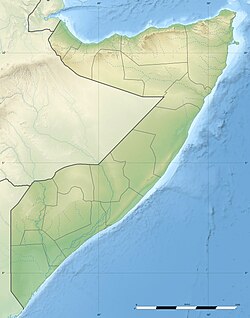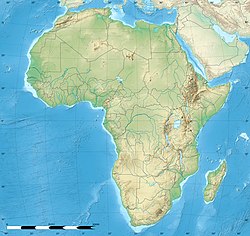Hudur
Hudur
Huddur Hadame | |
|---|---|
Town | |
| Coordinates: 4°7′12″N 43°53′16″E / 4.12000°N 43.88778°E | |
| Country | |
| State | |
| Region | Bakool |
| District | Hudur District |
| Government | |
| • Mayor | Omar Abdullhi mohamoud |
| Population (2000) | |
| • Total | 120,000 |
| Time zone | UTC+3 (EAT) |
Hudur (Somali: Xuddur, Maay: Hudur) is a town in the south western Bakool region of Somalia, inhabited by Mirifle majority people Hadamo with Jiroon of the Rahanweyn tribes. It serves as the province's capital and the center of the Hudur District. The town is heart of the Maay language and Rahanweyn culture. Huddur is also known for being the hometown of influential politicians and leaders of Somalia.
History
[edit]During the Middle Ages, Hudur and its surrounding area was part of the Ajuran Empire that governed much of southern Somalia and eastern Ethiopia, with its domain extending from Hobyo in the north, to Qelafo in the west, to Kismayo in the south.[1]
In the early modern period, Hudur was ruled by the Geledi Sultanate. The kingdom was eventually incorporated into Italian Somaliland protectorate in 1910 after the death of the last Sultan Osman Ahmed.[2] After independence in 1960, the city was made the center of the official Hudur District.

During the Islamist insurgency of the 2000s, the city was seized by Al-Shabaab. In March 2014, Ethiopian AMISOM and Somali troops re-captured the town from the militants.[3] The offensive was part of an intensified military operation by the allied forces against Al-Shabaab.[4]
According to former Prime Minister Abdiweli Sheikh Ahmed, the government subsequently launched stabilization efforts in the newly liberated areas, which also included Wajid, Rabdhure and Burdhubo. The Ministry of Defence was providing ongoing reassurance and security to the local residents, and supplying logistical and security support to deliver relief assistance. Additionally, the Ministry of Interior was prepared to support and put into place programs to assist local administration and security. A Deputy Minister and several religious scholars were also dispatched to all four towns to coordinate and supervise the federal government's stabilization initiatives.[5]
Demographics
[edit]As of 2000, Hudur had a population of around 12,500 inhabitants.[6] The broader Hudur District has a total population of 93,049 residents.[7]
Ligse sub-clan Muuse Celi of sub-clan Celi Arap the sub-clan Arap Hadamo and Luwaay are both sub-clans of the Mirifle branch, which is part of the larger Rahanweyn family. The main language spoken in the town is the Cushitic Maay language.[8]
Notes
[edit]- ^ Lee V. Cassanelli, The shaping of Somali society: reconstructing the history of a pastoral people, 1600-1900, (University of Pennsylvania Press: 1982), p.102.
- ^ Cassanelli, Lee Vincent (1973). The Benaadir Past: Essays in Southern Somali History. University Microfilms International. p. 149.
- ^ "Somalia: Federal Govt, Ethiopian forces liberate strategic town of Hudur". Garowe Online. 7 March 2014. Archived from the original on 8 March 2014. Retrieved 8 March 2014.
- ^ "Somalia: Federal Govt, AMISOM troops clash with Al Shabaab". Garowe Online. 11 March 2014. Archived from the original on 11 March 2014. Retrieved 11 March 2014.
- ^ "SOMALIA: PM hosts meeting with International Community diplomats on stabilisation efforts". Raxanreeb. 12 March 2014. Archived from the original on 12 March 2014. Retrieved 12 March 2014.
- ^ "Somalia City & Town Population". Tageo. Retrieved 4 October 2013.
- ^ "Regions, districts, and their populations: Somalia 2005 (draft)" (PDF). UNDP. Retrieved 21 September 2013.
- ^ "Beesha Xawaadle oo ku tilmaamtay Maamulka Juba in aan loo dhammeyn". midnimo.com. Archived from the original on 2014-04-28.



